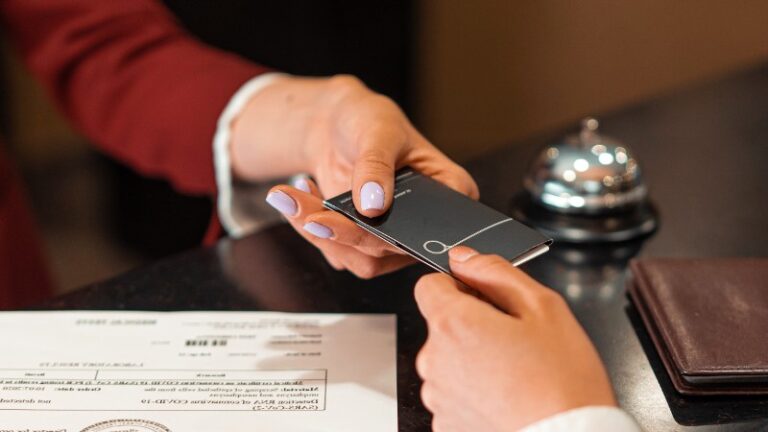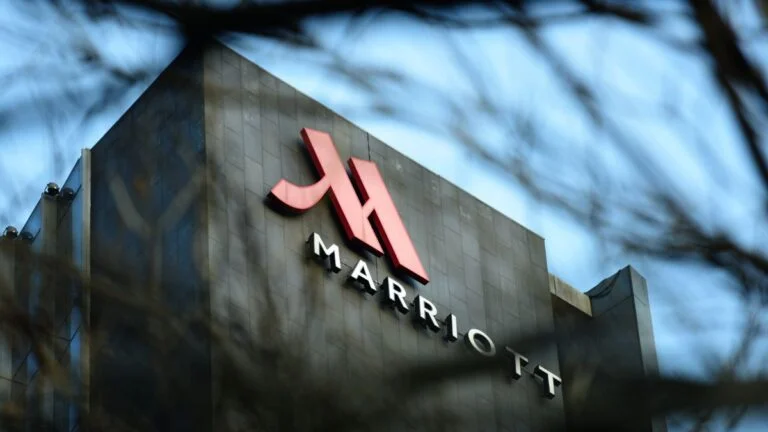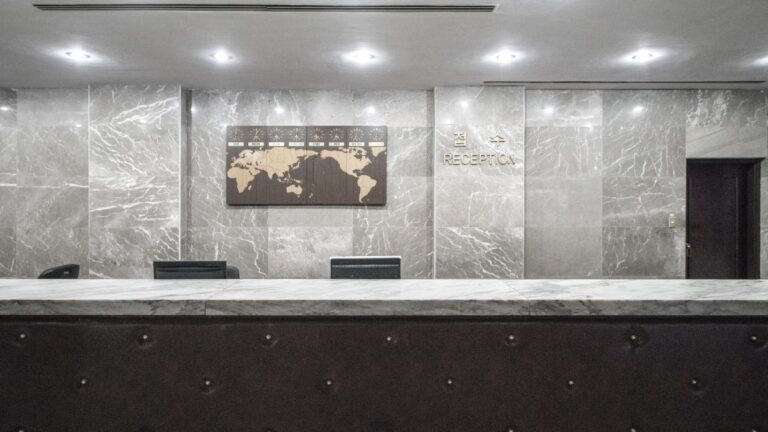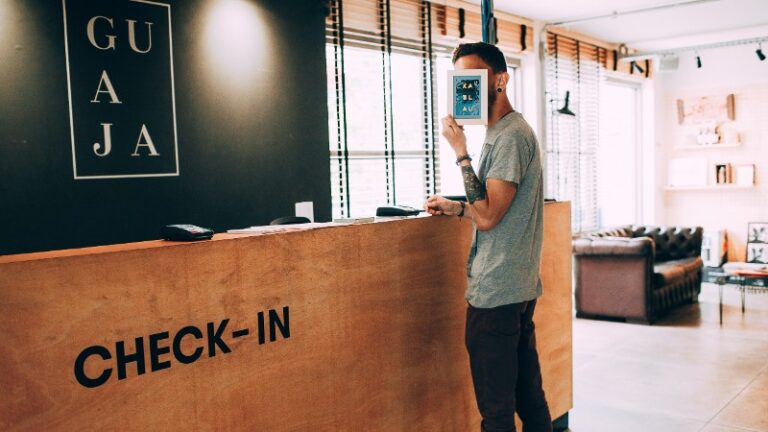How Long Does It Take To Clean A Hotel Room? A Quick Guide for Guests
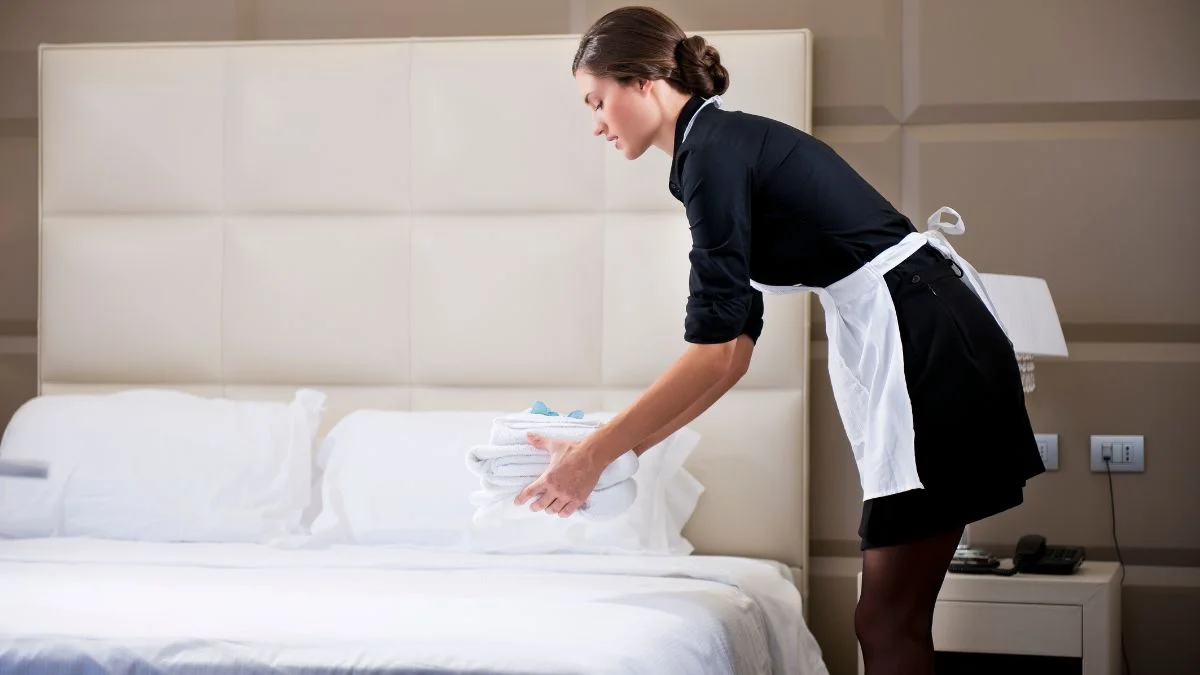
As participants in Amazon Associates and other programs, we earn from qualifying purchases. This comes at no additional cost to you. For more details, see our Affiliate Disclosure.
When you check out of a hotel room, leaving behind crumpled sheets and used towels, a team of professionals springs into action, ensuring the next guest steps into a spotless sanctuary. But how long does it actually take to transform a once-occupied room back to its pristine condition? Let’s delve into the intricacies of hotel room cleaning and discover the timeline behind this essential hospitality task.
HIGHLIGHTS
- On average, a standard hotel room is cleaned in about 25 to 30 minutes, though suites or rooms with added amenities can take up to 45 minutes to an hour.
- Hotel room cleaning follows a meticulous step-by-step process, from initial inspection to systematic cleaning and final checks.
- The efficiency of cleaning depends heavily on modern tools, refined techniques, and comprehensive training.
Understanding the Basics: The Step-by-Step Process of Room Cleaning
When a guest checks out of a hotel room, it initiates a thorough cleaning procedure to ensure that the next occupant is welcomed into a hygienic and comfortable space. Here’s a breakdown of the fundamental steps involved in the cleaning process:
- Initial Inspection: Housekeeping staff first evaluate the room’s condition to identify any potential damages, missing items, or unique cleaning requirements. This helps them determine the necessary resources and tools they might need.
- Clearing the Clutter: All trash is removed, and items left behind by guests are either discarded or handed over to lost and found, depending on their value.
- Stripping the Bed: All bed linens, including sheets, pillowcases, and duvet covers, are removed for laundering.
- Cleaning and Dusting: All surfaces, from nightstands to televisions, are wiped down and dusted. Special attention is given to high-touch areas like light switches, door handles, and remote controls.
- Bathroom Sanitization: Toilets, sinks, and showers or tubs are scrubbed and sanitized. Fresh towels are neatly arranged, and toiletries are restocked.
- Vacuuming and Floor Care: Depending on the type of flooring, housekeepers will either vacuum the carpet or mop hard surfaces.
- Making the Bed: Freshly laundered linens are used to make the bed, ensuring crisp folds and a neat appearance.
- Final Touches: Window treatments are straightened, furniture is realigned, and any in-room amenities like coffee or tea stations are replenished.
- Final Inspection: Once cleaning is completed, the room undergoes a final check to ensure everything meets the hotel’s standards. Only then is the room declared ready for the next guest.
This systematic approach ensures consistency in cleanliness and service quality, upholding the hotel’s reputation and ensuring guest satisfaction.
How Long Does It Take To Clean A Hotel Room?
The time required to clean a hotel room can vary based on several factors, but on average, a standard hotel room is cleaned in about 25 to 30 minutes. This duration can increase for larger suites or rooms with more amenities, potentially taking up to 45 minutes to an hour.
However, if a room has been heavily used or is in a particularly untidy state, the cleaning time might extend further. It’s worth noting that these are average times, and the exact duration can differ based on the hotel’s standards, staff expertise, and available resources.
Factors Influencing Cleaning Time: Room Size, Guest Usage, and Amenities
The time it takes to clean a hotel room can vary significantly based on several factors. While hotels aim to maintain a standard duration for room cleaning to streamline their operations, certain elements can extend or reduce the required time. Let’s explore the primary factors influencing the cleaning duration:
- Room Size and Type: Naturally, a larger room or suite will take longer to clean than a standard room. Executive suites, family rooms, or themed rooms with more furniture or additional rooms such as a living area or kitchenette can add to the cleaning time.
- Guest Usage: The state in which a guest leaves a room can greatly affect cleaning duration. A room that’s relatively tidy with minimal mess will be quicker to turn around than one where, for instance, there was a party, kids crafting sessions, or extended stays without daily housekeeping.
- Amenities and Special Features: Rooms equipped with added amenities, like a hot tub, balcony, or a mini-bar, will require extra attention. These features might need specialized cleaning or replenishing which can add to the time.
- Frequency of Cleaning: Some guests prefer not to have daily cleaning, opting for a “Do Not Disturb” sign. While this might seem like it saves time, rooms that go several days without cleaning can actually take longer when housekeepers finally get to them, due to accumulated dust, trash, and used amenities.
- Special Requests and Allergies: If a guest has specific allergies, housekeeping might need to use specialized cleaning products or methods to ensure the room is allergen-free. This could involve using fragrance-free cleaning products, ensuring that no feathered products are in the room, or giving carpets an extra vacuum.
- Equipment Efficiency: The type and efficiency of cleaning equipment can also play a role. Modern, high-performance vacuum cleaners, steam cleaners, or ultraviolet sanitization devices can significantly reduce the time required compared to older or less efficient tools.
- Seasonal Factors: In places where there’s a lot of sand or where guests might be trekking in mud or snow, additional cleaning might be needed, especially for flooring.
Understanding these variables can help hoteliers optimize their cleaning protocols and also set realistic expectations for both staff and guests. Efficiently managing these factors ensures that the quality of service remains high without compromising on cleanliness.
Tools, Techniques, and Training: How Professionals Achieve Speed and Efficiency
In the bustling world of hotel housekeeping, achieving both speed and efficiency in room cleaning is paramount. These goals are met through a combination of modern tools, honed techniques, and rigorous training. This triad ensures that rooms are not only immaculate but are also ready in the quickest time possible, striking the balance between speed and quality.
The Evolution of Cleaning Tools: In the realm of hotel cleaning, there has been a significant shift from basic brooms and mops to advanced vacuum cleaners, steam cleaners, and ultraviolet sanitization devices. These tools not only offer deeper cleaning but also save precious time.
The Art of Systematic Cleaning: Effective housekeepers follow a specific sequence or pattern when cleaning a room, ensuring they don’t miss a spot or have to redo steps. By working systematically—often top-to-bottom and left-to-right—they maximize their efficiency and ensure thoroughness.
Training Regimens and Workshops: Many hotels invest in regular training sessions for their housekeeping staff. This not only keeps them updated with the latest cleaning techniques but also educates them about the newest tools in the market. Additionally, workshops focusing on time management and multitasking further refine their skills.
Adapting to Technological Advancements: Technology isn’t just about tools; it also encompasses the software and systems used for scheduling, tracking, and managing cleaning tasks. By leveraging technology, hotels can allocate resources more efficiently and respond to cleaning needs more swiftly.
Sustainability and Efficiency: In today’s eco-conscious world, many hotels are adopting green cleaning products and methods. These sustainable practices, when combined with efficient techniques, ensure rooms are not only clean but also environmentally friendly.
Challenges and Innovations: Balancing Quality with Modern Demands
The hotel industry constantly evolves, adapting to the changing demands of travelers and integrating innovations to improve guest experience. However, this evolution brings its own set of challenges, especially when it comes to maintaining the quality of room cleaning. As hotels strive to achieve excellence, they grapple with a blend of traditional hurdles and modern-day expectations.
The Guest Expectation Conundrum: As travel becomes more accessible, guests’ expectations rise. They seek instant services, like rapid room turnovers, without compromising on quality. This demand puts pressure on housekeeping staff to work faster, yet more meticulously.
Tech Integration and Training: While technological innovations promise efficiency, they require staff to undergo consistent training. The integration of new cleaning machines or hotel management software necessitates not only an investment in equipment but also in educating the staff.
Environmental Concerns and Sustainable Solutions: There’s a growing demand for eco-friendly hotels. This means transitioning to sustainable cleaning agents, which, while environmentally friendly, might initially seem less potent than chemical counterparts. Hotels need to balance eco-friendliness with efficacy.
Language and Communication Barriers: Hotels, especially in tourist hubs, employ a diverse workforce. Sometimes, communication barriers can pose challenges in training and daily operations. Modern solutions like multilingual training modules or translation apps can help bridge this gap.
Enhanced Cleaning in the Post-pandemic Era: The COVID-19 pandemic ushered in a heightened emphasis on sanitation and hygiene. Hotels now have to ensure deep cleaning and frequent sanitization, while also communicating these measures effectively to reassure guests.
Customization and Personalized Experiences: In the age of personalization, guests often have specific room preferences or special requests, from allergen-free rooms to specific types of room fragrances. Catering to these custom requests while maintaining operational efficiency can be challenging.
Balancing the age-old commitment to quality with the ever-evolving demands of the modern traveler requires a mix of adaptability, training, and innovation. As challenges arise, the industry continues to find ingenious solutions to keep pace and deliver impeccable experiences.
A Day in the Life: The Realities of a Hotel Housekeeper’s Routine
Dawn often marks the start of a hotel housekeeper’s day. With a quick team briefing, they familiarize themselves with their assigned floors and any special room requests. The first task typically involves stripping beds and gathering laundry, followed by a thorough dusting of the room. As sunlight filters in, bathrooms receive a meticulous scrub, ensuring each surface gleams.
By mid-morning, fresh linens are laid out, and amenities are replenished. The hum of a vacuum signals the room’s final touch-ups. During a short lunch break, housekeepers share stories and experiences, rejuvenating for the tasks ahead.
The afternoon might bring deeper cleaning projects or attending to guest requests, from extra towels to room service clean-up. Each room poses its unique challenges, be it a stubborn stain or a malfunctioning appliance. Throughout the day, the housekeeper coordinates with the front desk, updating on room statuses and any potential issues.
As the sun sets, the day’s hustle winds down. Final room checks and a handover to the night shift mark the day’s end. Exhausted yet content, the housekeeper departs, knowing they’ve played a crucial role in countless guest experiences.

